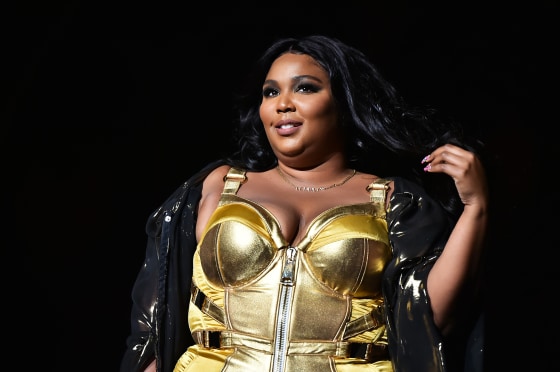As Lizzo proclaimed in her newest single, "Rumors," plenty of people are more than happy to devote their lives to “tryna break a woman down.” And the hitmaker is quite aware that when she posts on TikTok, or releases new music, she’s bound to face a deluge of hate. The internet is full of people who would love nothing more than to tear a confident, beautiful and talented Black woman down. Even so, watching Lizzo break down on social media this week resonated with a lot of people. Her pain cuts deep, because it’s a reminder of the often unseen costs of public empowerment.
The internet is full of people who would love nothing more than to tear a confident, beautiful, and talented Black woman down.
"Rumors," Lizzo's first single since 2019, features hip-hop's latest go-to collaborator Cardi B, who has faced her fair share of criticism and controversy for her appearance and lyrics. The music video seems to draw inspiration from the Disney flick “Hercules”’ and its five muses, except this version is focused on plus-size Black women, dripping in gold, and a glowingly pregnant Cardi B.
The track is uptempo, cheeky and very poppy, in keeping with Lizzo’s previous hits. It's a fun late-summer jam. Yet, within minutes of the song and video's release, the internet trolls emerged, spewing fatphobic and racist bigotry.
A viral tweet that has since been deleted criticized the three-time Grammy winner and labeled her "a mammy for the white gaze." "Mammy" is a trope often used to describe Black female slaves who took care of their master’s family — a large-size, dark-skinned Black woman who is happy to serve white people. It’s also a term that is triggering for Black people, reminding us of such “classic” films as “Gone With the Wind” and racist marketing like Aunt Jemima.
The tweeter seems to have been implying that Lizzo’s music caters to a white demographic. And incredibly, others seemed to agree. Or at least, enough agreed for the singer to take notice.
But what’s really going on here? The “Rumors” music video itself gave no evidence that Lizzo is appealing to the white gaze — in fact, there are no white people appearing in the video at all. Instead, this was a moment highlighting and showcasing Black beauty.
A clearly shaken Lizzo defended herself on TikTok, calling the “Mammy” stereotype hurtful. The idea that her music is somehow catering to the white patriarchal gaze is “fatphobic" and "racist," she added. "What I won't accept is y'all doing this to Black women over and over and over again, especially us big Black girls. When we don't fit into the box that you want to put us in, you just unleash hatred onto us. It's not cool."
This isn’t the first time Lizzo has faced judgment about her body size. In 2020, the celebrity fitness trainer Jillian Michaels asked, “Why are we celebrating her body? Why does it matter? Why aren't we celebrating her music? Because it isn't going to be awesome if she gets diabetes." With no concrete evidence to suggest the singer is anything other than perfectly healthy, Michael made a lot of racialized and gendered assumptions about Lizzo’s body. And yet, I didn’t see Michaels criticizing DJ Khaled’s appearance or trying to shame him into wearing a shirt on stage.
Witnessing Lizzo’s confidence triggers many people, including Black women who may not be allowed the agency to proudly embrace their body, sexuality and talents.
Lizzo’s confidence clearly triggers many people, including Black women who may not be allowed the agency to proudly embrace their body, sexuality and talents. More broadly, from Serena Williams to Beyonce, we know audiences have been threatened by a Black woman who is sure of herself, and have repeatedly looked for ways to humble her.
The endless shaming over the last few days broke the usually vivacious singer down. Instead of celebrating her new music, Lizzo found herself on Instagram Live crying and revealing her frustration. "It's like it doesn't matter how much positive energy you put into the world, you're still going to have people who have ... something mean to say about you," she confessed to fans. "And for the most part it doesn't hurt my feelings; I don't care. I just think when I'm working this hard, my tolerance gets lower. ... I'm more sensitive, and it gets to me."
Lizzo certainly isn’t the only one who is finding their defenses a little lower right now. This summer, we witnessed multiple Black women get attacked after speaking out about their mental health; they were called unpatriotic, accused of lying or told to just be quiet. Black women deserve to be celebrated, deserve to be given the space to enjoy their accomplishments, deserve to love extraordinary beauty and be able to share their feelings without criticism. As a Black woman who faces my own share of daily adversities, I often wonder, will we ever be allowed to just be ourselves? Despite the internet trolls, I’m confident Lizzo’s DNA will always be “100 percent that b----.” May we all be so lucky.


